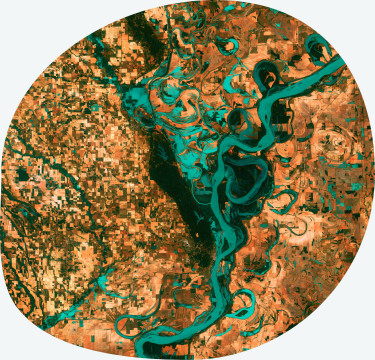About
About
The Water Knowledge Hub is a global peer-to-peer knowledge exchange platform that supports water security and climate resilience by promoting the implementation of Integrated Water Resources Management (IWRM) worldwide.

What is the Water Knowledge Hub?
Launched in 2003 as the GWP IWRM Toolbox, the platform was conceived as a practical, demand-driven resource to help practitioners, policymakers, and water managers translate IWRM principles into concrete actions. The Toolbox responded to a critical gap: while IWRM had been widely endorsed—most notably at the 1992 Rio Earth Summit and the 2002 World Summit on Sustainable Development—there was limited accessible, practical guidance on how to put it into practice. GWP addressed this by developing a user-friendly repository that combined conceptual frameworks, practical tools, and real-world case studies contributed by its global network of partners.
To remain relevant and innovative, the Toolbox underwent several major updates. Its tools and structure were fully revised in 2008 and again in 2016. In 2021, it was relaunched as the IWRM Action Hub, reflecting the growing demand for more interactive, collaborative, and action-oriented resources. In 2025, the platform was renamed the Water Knowledge Hub to broaden its scope beyond IWRM, strengthening knowledge exchange, capacity development, and peer-to-peer learning across the water sector.
Today, the Water Knowledge Hub remains a cornerstone of GWP’s mission. It provides a global space for water professionals to connect, share experiences, and co-create solutions—advancing water security and climate resilience through data-driven, evidence-based action.
Frequently Asked Questions (FAQs)
The Water Knowledge Hub is a global peer-to-peer knowledge exchange platform that supports water security and climate resilience by promoting the implementation of Integrated Water Resources Management (IWRM) worldwide.
The Water Knowledge Hub is for anyone interested in adopting better practices for the management of water or learning more about how to improve water management at a local, national, regional or global level.
More specifically it addresses the user needs of these four primary target audiences:
- Government officials
- Civil society and grassroot organizations
- Academia and students
- Regional and Country Water Partnerships
The Water Knowledge Hub is home to a growing network of community portals and microsites – dynamic, peer-to-peer spaces dedicated to specific areas of water management. Examples include the Community of Learning and Practice on Drought Management or the Community of Learning and Practice on Drought Management.
Each portal or microsite comes with its own branding, unique URL, registration page, and dedicated community space, while seamlessly benefiting from the rich knowledge base and advanced technological environment of the Water Knowledge Hub. Members of these communities are automatically part of the wider Hub, thus gaining access to a vibrant ecosystem of knowledge, exchange, and collaboration.
If you’re looking to elevate your community and connect with water experts worldwide, we’d be delighted to host your portal or microsite on the Water Knowledge Hub. Feel free to contact us for more information at waterknowledgehub@gwp.org
Go to our Water Action Network to find professionals in your related field and/or browse our communities and join the ones relevant to your interests.
To experience this, you will first need to register as a member of the Water Knowledge Hub. We look forward to having you!
Members of the Water Knowledge Hub are encouraged to share their experiences and submit their case study via the online form. More information about the submission and review process are available here.
We also encourage you to join a community to share your thoughts, resources, events, or opportunities with others.
Here you can find a couple examples on how to cite content published on the IWRM Action Hub. If a resource or case study is specific to the GWP Toolbox, please follow the guidelines below.
Citing a Tool:
- GWP (2025). [Tool Code: Tool Name]. Accessed [Date information retrieved] from [link to tool page].
Example:
- GWP (2025). Tool A3.01: National IWRM Plans. Accessed (1 January 2025) from https://www.gwptoolbox.org/learn/iwrm-tools/national-iwrm-plans
Citing a Case Study:
- Author(s)/Organisation(s) (Year published). Title. On Water Knowledge Hub. Accessed [Date information retrieved] from [link to case study]
Example:
- Diaz, L.R., (2013). Argentina: Drinking water supply system for rural population of Eastern Tucuman. On Water Knowledge Hub. Accessed (1 January, 2022) from https://www.gwptoolbox.org/case-study/argentina-drinking-water-supply-s…
Citing other Hub Pages:
- GWP (2025). [Page Name]. On Water Knowledge Hub. Accessed [Date information retrieved] from [link to page].
Example:
- GWP (2025). IWRM Explained. On Water Knowledge Hub. Accessed (1 January 2022) from https://www.gwptoolbox.org/learn/iwrm-explained
Citing a Resource:
For technical references and official documents please check the resource itself which most often contains the preferred citation format. Otherwise, we advise you to follow one of the standard citation formats (APA, MLA, Chicago etc.) that best fits your purpose. If no citation format is available, please cite as follows:
- Publisher (Year published). Title. On Water Knowledge Hub. [Date information retrieved] from [link to resource].
Example:
- Value Reporting Foundation (2021). International Integrated Reporting Framework. On Water Knowledge Hub. Accessed (1 January 2025) from https://www.gwptoolbox.org/resource/international-integrated-reporting-…
For academic resources published in peer-reviewed journals, use the resource’s own citation. Please select ‘View Resource’ on a resource page and you will be redirected to the publishing site. This is often included as a “Suggested Citation” in the bottom of the article or as ‘Cite’ button on the publishing site page.
Example:
Erin L O’Donnell, At the Intersection of the Sacred and the Legal: Rights for Nature in Uttarakhand, India, Journal of Environmental Law, Volume 30, Issue 1, March 2018, Pages 135–144, https://doi.org/10.1093/jel/eqx026
Partners and Sponsors
The Water Knowledge Hub is supported by a diverse network of partners and funding organisations, including:


